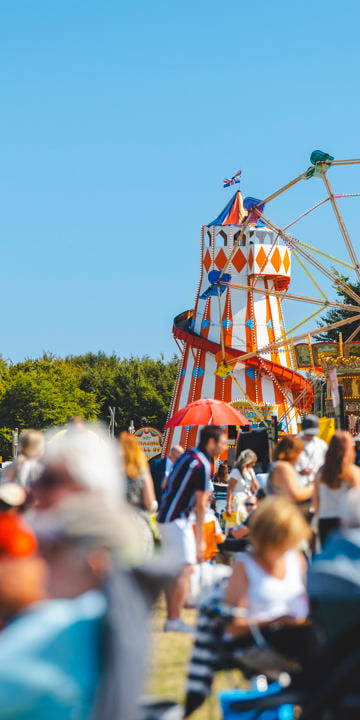-
Events
-
Festival of Speed


Have you visited our Forest Rally Stage?
From 2005 to present there has been a demonstration area for the rally cars at the top of the hill
-
Goodwood Revival


Goodwood Heroes
Legend of Goodwood's golden racing era and Le Mans winner Roy Salvadori once famously said "give me Goodwood on a summer's day and you can forget the rest".
-
Members' Meeting


More than motorsport...
Ferret racing and duck herding are two of the many off-track activities at Members' Meeting -
Qatar Goodwood Festival


St Simon
Whoa Simon! A horse so determined and headstrong, he not only won the 1883 Goodwood Cup by 20 lengths, but couldn't be stopped and carried on running over the top of Trundle hill
-
Goodwoof


Start in style
The breed parade sees hundreds of dogs and their owners walk from Goodwood House down to The Kennels to kick start the Goodwoof weekend. -
Horseracing
-
Season Opener
-
May Festival
-
Family Race Day
-
Three Friday Nights
-
August Bank Holiday
-
Autumn Racing
-
Season Finale


Racing Colours
The red & yellow of the Racecourse can be traced back hundreds of years, even captured in our stunning Stubbs paintings in the Goodwood Collection
-
Season Opener
-
Breakfast Club


A perfect Sunday morning?
A no-cost, all-welcome motoring show where the visitors and their machines are the stars -
Health Summit
-
Hospitality
-
Exhibiting
-
Partnerships


Where else can you...
...plan strategy in an ancient woodland, enjoy award-winning dining then drive around a racetrack?
-
What's on
-
Festival of Speed
-
Visit, Eat, Stay
-
The Goodwood Hotel
-
Rooms
-
Contact Us
-
Christmas
-
New Year's Eve
-
Weddings
-
Kids Activities
-
Offers
-
Local Attractions
-
Plan your stay


21,000 litres...
Alongside the award-winning meat, we also produce 21,000 litres of milk a week, used to make our cheeses. -
Rooms
-
Goodwood Cottages


Fashionable foxhounds
The 1st Duke of Richmond bought Goodwood in 1697 as a place to stay to go foxhunting with the fashionable Charlton Hunt. -
Goodwood House


The Goodwood menagerie
Corridors of tunnels beneath Goodwood House were once filled with exotic animals to surprise female guests and allow the men to look heroic! -
Restaurants
-
Farmer, Butcher, Chef

-
The Goodwood Bar & Grill

-
The Kennels

-
Aerodrome Café

-
Motor Circuit Café

-
Cafe 24


Sustainable state-of-mind
When Farmer, Butcher, Chef opened in 2016 it was awarded the UK’s first-ever Royal Academy of Culinary Arts ‘Sustainable Food Philosophy Seal’. -
Farmer, Butcher, Chef
-
The Kennels


How old is The Kennels?
Built in 1787 by celebrated architect James Wyatt to house the third Duke of Richmond’s prized fox hounds, The Kennels was known as one of the most luxurious dog houses in the world!
-
Motor Circuit


A bright future at #FOS
Future Lab is Goodwood's innovation pavilion, inspiring industry enthusiasts and future scientists with dynamic tech
-
Health & Wellbeing
-
Membership
-
Health Club
-
Gym
-
Run Club
-
Run Series
-
Spa Treatments
-
Wellness Retreats

-
Events Calendar
-
Corporate Wellbeing
-
Health Summit

-
Latest News


Goodwood's first Health Summit...
...took place in 2023 with industry experts discussing nutrition costs and food systems for a healthier future. -
Membership
-
Hound Lodge


Family Trees
Revel in the history of our hounds with their family trees dating back to some of our earliest documents at Goodwood.
-
Goodwood Farm Shop


St Simon
Whoa Simon! A horse so determined and headstrong, he not only won the 1883 Goodwood Cup by 20 lengths, but couldn't be stopped and carried on running over the top of Trundle hill
-
Parties
-
Goodwood Art Foundation
-
The Goodwood Hotel
-
Motorsport
-
Festival of Speed


Taming the "Beast"
The Fiat S76 or "Beast of Turin" is a Goodwood favourite and can usually be heard before it is seen at #FOS
-
Goodwood Revival


"Mr Goodwood"
Sir Stirling Moss was one of the founding patrons of the Festival of Speed, and a regular competitor at the Revival.
-
Members' Meeting


"Motorsport garden party of the gods"
Festival of Speed is our longest-standing Motorsport event, starting in 1993 when it opened to 25,00 people. We were expecting 2000!
-
Breakfast Club


A perfect Sunday morning?
A no-cost, all-welcome motoring show where the visitors and their machines are the stars -
Motor Circuit


Estate Crest
"En la rose je fleurie" or "Like the rose, I flourish" is part of the Richmond coat of Arms and motto
-
Driving Experiences


"Mr Goodwood"
Sir Stirling Moss was one of the founding patrons of the Festival of Speed, and a regular competitor at the Revival.
-
Goodwood Road Racing Club


Mad Mike
FOS Favourite Mad Mike Whiddett can be caught melting tyres in his incredible collection of cars (and trucks) up the hillclimb
-
Latest News
-
Festival of Speed
-
Horseracing
-
Tickets & Packages


Why does everyone wear hats?
One Summer, King Edward VII turned his back on the traditional morning suit, and donned a linen suit and Panama hat. Thus the Glorious Goodwood trend was born.
-
Hospitality


The Magnolia Cup
Leading women of business, sport, fashion and media, take part in one of the most exciting horseracing events in the world.
-
Goodwood Horseracing Club


"Glorious Goodwood"
The first public race meeting took place in 1802 and, through the nineteenth century, ‘Glorious Goodwood,’ as the press named it, became a highlight of the summer season
-
Fixtures & Events
-
Season Opener

-
May Festival

-
Family Race Day

-
Three Friday Nights

-
Qatar Goodwood Festival

-
August Bank Holiday

-
Autumn Racing

-
Season Finale



Wearing Linen at the Races
Ever since King Edward VII relaxed the dress code in the 19th century, we have enjoyed a carefree holiday feel here, unlike any other racecourse. -
Season Opener
-
Qatar Goodwood Festival


Why does everyone wear hats?
One Summer, King Edward VII turned his back on the traditional morning suit, and donned a linen suit and Panama hat. Thus the Glorious Goodwood trend was born.
-
Three Friday Nights


Wearing Linen at the Races
Ever since King Edward VII relaxed the dress code in the 19th century, we have enjoyed a carefree holiday feel here, unlike any other racecourse. -
Plan Your Day
-
Enclosures
-
Event Map
-
Going Report
-
Getting Here
-
Betting at Goodwood
-
Dress Code
-
Accessibility
-
Food & Drink


Racing Colours
The red & yellow of the Racecourse can be traced back hundreds of years, even captured in our stunning Stubbs paintings in the Goodwood Collection
-
Enclosures
-
Buy Merchandise
-
Partners
-
Owners & Trainers
-
Latest News
-
FAQs
-
Accessibility
-
Tickets & Packages
-
Experiences
-
Driving


When was the GRRC founded?
Established in 1998 by the Duke of Richmond, the Goodwood Road Racing Club offers exclusive benefits across the estate year-round -
Flying


Group Captain Sir Douglas Bader
The famous fighter ace, who flew his last sortie from Goodwood Aerodrome, formerly RAF Westhampnett has a statue in his honor within the airfield.
-
Golf


Over 100 years of Golf
The first ever round of golf played at Goodwood was in 1914 when the 6th Duke of Richmond opened the course on the Downs above Goodwood House.
-
Shooting


During the war...
The Motor Circuit was known as RAF Westhampnett, active from 1940 to 1946 as a Battle of Britain station.
-
Afternoon Tea


Minor furniture details
The exquisite mirror in the Ballroom of Goodwood House it so big they had to raise the ceiling to get it inside!
-
Corporate Wellbeing


Goodwood's first Health Summit...
...took place in 2023 with industry experts discussing nutrition costs and food systems for a healthier future. -
Cycling


Battle of Britain
Flying training began at Goodwood in 1940 when pilots were taught operational flying techniques in Hurricanes and Spitfires.
-
Corporate Experiences


Where else can you...
...plan strategy in an ancient woodland, enjoy award-winning dining then drive around a racetrack?
-
Spa Treatments
-
Driving
- Hospitality
-
Golf
-
Golf Courses


Braid’s Masterpiece
One of the greatest golfers of all time, James Braid designed Goodwood’s iconic Downland course, opened in 1914.
-
Golf Membership
-
Credit Membership
-
Application Form
-
Intermediate Membership
-
Junior Membership
-
Corporate Membership
-
Copse Membership


Braid’s Masterpiece
One of the greatest golfers of all time, James Braid designed Goodwood’s iconic Downland course, opened in 1914.
-
Credit Membership
-
The Academy


A sporting Estate
Goodwood has two 18-hole championship courses, a modern clubhouse and an impressive Academy. -
Golf Experiences


Over 100 years of Golf
The first ever round of golf played at Goodwood was in 1914 when the 6th Duke of Richmond opened the course on the Downs above Goodwood House.
-
Golf Courses
-
Flying
-
Flying School


Battle of Britain
Flying training began at Goodwood in 1940 when pilots were taught operational flying techniques in Hurricanes and Spitfires.
-
Aero Club Membership


Flying with Goodwood
Come with us for an epic journey. -
Flying Experiences

-
Pilot Information


Battle of Britain
Flying training began at Goodwood in 1940 when pilots were taught operational flying techniques in Hurricanes and Spitfires.
-
Flying School
-
Meetings
-
Venue Hire


Where else can you...
...plan strategy in an ancient woodland, enjoy award-winning dining then drive around a racetrack?
-
Plan Your Meeting
-
Parties


Where else can you...
...plan strategy in an ancient woodland, enjoy award-winning dining then drive around a racetrack?
-
Hospitality

-
Corporate Experiences


Where else can you...
...plan strategy in an ancient woodland, enjoy award-winning dining then drive around a racetrack?
-
Christmas Parties

-
Film Locations


Filming at Goodwood
We have been host to many incredible film crews using Goodwood as a backdrop for shows like Downton Abbey, Hollywood Blockbusters like Venom: let there be Carnage and the Man from U.N.C.L.E.
-
Venue Hire
-
Weddings
-
Goodwood House


Our Paintings Collection
The origins of the collection lay in the possessions of Louise de Keroualle, Duchess of Portsmouth, and Duchess of Aubigny in France, to whom some of the paintings originally belonged.
-
The Kennels


How old is The Kennels?
Built in 1787 by celebrated architect James Wyatt to house the third Duke of Richmond’s prized fox hounds, The Kennels was known as one of the most luxurious dog houses in the world!
-
Parties


Where else can you...
...plan strategy in an ancient woodland, enjoy award-winning dining then drive around a racetrack?
-
Goodwood House
-
Memberships
-
Goodwood Road Racing Club


When was the GRRC founded?
Established in 1998 by the Duke of Richmond, the Goodwood Road Racing Club offers exclusive benefits across the estate year-round -
Goodwood Horseracing Club


Racing Colours
The red & yellow of the Racecourse can be traced back hundreds of years, even captured in our stunning Stubbs paintings in the Goodwood Collection
-
Golf At Goodwood


Braid’s Masterpiece
One of the greatest golfers of all time, James Braid designed Goodwood’s iconic Downland course, opened in 1914.
-
Goodwood Aero Club


Flying with Goodwood
Come with us for an epic journey. -
Goodwood Health Club


Goodwood's first Health Summit...
...took place in 2023 with industry experts discussing nutrition costs and food systems for a healthier future. -
The Kennels


Fashionable foxhounds
The 1st Duke of Richmond bought Goodwood in 1697 as a place to stay to go foxhunting with the fashionable Charlton Hunt. -
Sporting Membership


Carne's Seat
Just beyond Goodwood House along the Hillclimb, the 2nd Dukes banqueting house was also known as "one of the finest rooms in England" (George Vertue 1747).
-
Goodwood Racehorse Owners Group
-
Goodwood Art Foundation
-
Goodwood Road Racing Club
- Classic Car Insurance
- Health & Wellbeing
- Buy Merchandise
-
Our Estate
-
What's on

-
Estate Map


Battle of Britain
Flying training began at Goodwood in 1940 when pilots were taught operational flying techniques in Hurricanes and Spitfires.
-
Stories from the Estate


Grogger
Easy boy! The charismatic Farnham Flyer loved to celebrate every win with a pint of beer. His Boxer dog, Grogger, did too and had a tendancy to steal sips straight from the glass.
-
Sports
-
Goodwood Education Trust


Estate Crest
"En la rose je fleurie" or "Like the rose, I flourish" is part of the Richmond coat of Arms and motto
-
Charities


Group Captain Sir Douglas Bader
The famous fighter ace, who flew his last sortie from Goodwood Aerodrome, formerly RAF Westhampnett has a statue in his honor within the airfield.
-
Sustainability


Sustainable state-of-mind
When Farmer, Butcher, Chef opened in 2016 it was awarded the UK’s first-ever Royal Academy of Culinary Arts ‘Sustainable Food Philosophy Seal’. -
Diversity, Equity & inclusion
-
Property


Egyptian Dining Room
Testament to the 19th-century fascination with ancient Egypt and decorative opulence. The room is richly detailed with gilded cartouches, sphinxes, birds and crocodiles.
-
Walking Guide


During the war...
The Motor Circuit was known as RAF Westhampnett, active from 1940 to 1946 as a Battle of Britain station. -
Dog Walking Field
-
Careers


Estate Crest
"En la rose je fleurie" or "Like the rose, I flourish" is part of the Richmond coat of Arms and motto
-
Goodwood Art Foundation
-
Farm Shop
-
What's on
Upcoming Events
The Gut–Brain Connection: Can What You Eat Really Change How You Feel?
In a time of rising stress, emotional fatigue and mental overwhelm, Goodwood Health & Wellbeing introduces the Mood Food Connection Retreat, a science-informed, holistic health journey into how food, gut health and neuroscience converge to restore emotional balance, clarity and resilience.
Set in the peaceful expanse of Goodwood’s 11,000-acre estate, this retreat is inspired by the work of clinical nutritionist Stephanie Moore, author of Eat Your Brain Happy, whose philosophy translates cutting-edge research into practical, sustainable wellbeing.
mood food
Retreats
Health & Wellbeing
Fitness
fitness tips
latest news

The Gut–Brain Axis: The Science Behind “What You Eat Changes How You Feel”
Modern neuroscience now supports what traditional wisdom long suggested: our digestive system and brain are in constant two-way communication. The microbiome-gut-brain axis describes how gut microbes, neural pathways (like the vagus nerve), immune signalling and endocrine systems interact to influence mood, cognition and stress response.
In people with depression or anxiety, studies often find altered microbial diversity and disruptions in neurotransmitter pathways, especially in how the gut influences production or availability of serotonin, GABA and dopamine.
A landmark review recommends that gut dysbiosis (microbial imbalance) may contribute to depressive disorders via systemic inflammation, barrier breakdown (leaky gut) and HPA (stress axis) overactivation.
Why Nutrients Matter: Building a Brain-Friendly Menu
Every bite becomes a signal to the brain.
- Omega-3 fatty acids, particularly EPA and DHA, are anti-inflammatory, support neuronal membrane health and help regulate mood. Studies link higher omega-3 intake to lower depression risk.
- Magnesium, B vitamins and protein are essential cofactors in neurotransmitter synthesis (serotonin, GABA, dopamine).
- Fermented foods and prebiotics help feed beneficial gut bacteria, leading to production of short-chain fatty acids (SCFAs) such as butyrate, which strengthen the gut barrier, reduce inflammation, and influence brain chemistry.
- Regulating blood sugar with low-GI, complex-carbohydrate foods helps avoid energy crashes and supports mood stability.
In Alzheimer’s research, gut microbiota changes are now under scrutiny for their role in amyloid deposition and neuroinflammation. Some studies suggest that altered gut communities may influence disease progression, and that microbial metabolites (like propionate) might slow pathological changes in animal models.
One mouse model study even found that germ-free Alzheimer’s mice had much less amyloid pathology compared to those with normal gut microbiota, hinting at a microbial role in disease expression.
From Theory to Practice: What You’ll Experience on Retreat
During the Mood Food Connection Retreat, participants engage in immersive sessions such as “The Biology of an Unhappy Brain” and “Which is in Charge: Your Gut or Your Brain?” to decode how diet, stress, gut microbes and mood intertwine.
Guests will enjoy menus built around anti-inflammatory, microbiome-supportive ingredients - organic, estate-sourced where possible - including oily fish, leafy greens, legumes, seeds and fermented foods. Each meal is curated not just for flavour, but for function: to feed beneficial bacteria, reduce gut permeability and support neurotransmitter balance.
In conversation, Stephanie shares:
“Gut permeability is a major contributor to anxiety and low mood. When harmful bacteria produce inflammatory compounds that leak into circulation, they may reach the brain and trigger depressive or foggy states.”
Complementing the nutrition work and educational content on the retreat are energy-based practices, such as Emotional Freedom Technique and somatic practices, including an activating Mindful Movement session. Throughout a stay, guests will experience therapies like cranial osteopathy, abdominal massage, reflexology, movement, breath walks and sound/vagal tone therapy. The entire programme assists in nervous system regulation and emotional balance.
A Lasting Reset, Not a Pause Button
This retreat offers more than rest; it’s a bridge to sustainable habits. Guests leave with a Happy Brain Action Plan that translates insights into daily practices for digestion, stress resilience and mood support.
Stephanie puts it simply:
“You’ll not only understand how food shapes brain chemistry, you’ll live it, feel it and have the tools to sustain it in your everyday life.”
You can also extend your experience by combining this with the Art & Ice Retreat, exploring cold exposure, breathwork and mindset training through the powerful Wim Hof Method cementing the whole experience with integration time of creative calm in Goodwood’s new Art Foundation as a powerful complement to the Mood Food work.
Discover more about the Mood Food Connection Retreat.
mood food
Retreats
Health & Wellbeing
Fitness
fitness tips
latest news





















